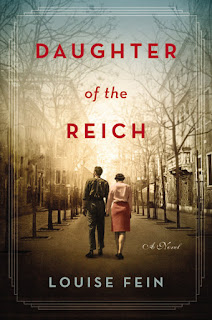Daughter of the Reich by Louise Fein
Most of this story is set within the two years preceding WWII, giving a glimpse into how humans in dire situation can be manipulated and pushed into doing atrocities.
The story is set in Leipzig and begins in 1933, quickly moving to 1937, giving a glimpse at what is happening in Germany during those years. Hetty’s family has just moved to a new big house, where previous tenants left their furniture and artwork. She is almost twelve years old. Her father is a high-ranking SS officer and she doesn’t understand what is happening. She just knows that they don’t go to church any longer as Herr Himmler wouldn’t like it. She dreams of being a doctor and now to her surprise she finds out that as a woman she can’t be a doctor, rather she needs to learn obedience and concentrate on home things. As Hitler promises “a brilliant future with no more poverty; no more class divisions. Just one, great, unified nation which will be the envy of all the world.”
Those who refuse to join SA recruitment go hungry, because they lose current jobs and can’t get another one. Those who are unwanted get charged with false crimes and are being convicted.
At schools, talks of population projections take big part. “A population of the best: the fittest, bravest, most beautiful, cleverest, and robust. The epitome of Darwin’s theory. A people who will be superior in every way and who must spread their influence throughout the world.”
“A newspaper, (…) is a powerful weapon. (…) it is our duty to shape the opinion of the masses and ensure the Fatherland’s values and best interests are always in the forefront of people’s minds.”
Hetty almost at the age of sixteen still struggles to make sense of this all. Her brother’s best friend, Walter, got shunned and she secretly is in love with him. He paints a touching picture for her what it means to be German. He paints a straightforward picture for her how differently Jews are being treated, pretty much cornered and left without provisions for livelihood. When she still struggles, he challenges her and her beliefs. He encourages her to be whatever she wants to be and not to follow others directions who limit her position in society and not expect to use her mind. He tells her of other countries where she can study medicine as a woman. She slowly starts realizing that there is another side to this story, to the world that has surrounded her. It takes Hetty time to mature, but giving the circumstances she is a believable character.
This story brings a vivid portrayal of distraction of lives, of feeding lies – one thing being said when in reality opposite is being done; of feeding hatred that pushes one man to commit horrible atrocities against another man that is even unbearable to think about.
Engagingly written. It is a heartbreaking story with a very poignant message.
“How could a people, a deeply civilized, democratic nation, become so unbelievably cruel; to de-humanise one another, and commit atrocities on such an unimaginable scale?” Don’t take your freedom and rights for granted and don’t let it slip away from you. Learn the lessons of the past.
Release date: 12 May 2020
Source: William Morrow; Head of Zeus
US/Canada title: Daughter of the Reich; UK title: People Like Us

Comments
Post a Comment